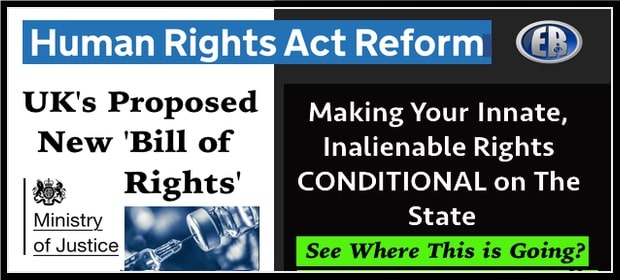
UK “reforming” human rights law…compulsory vaccines on the horizon?
KIT KNIGHTLY
The UK government is planning to re-work its human rights law to put an increased emphasis on “personal responsibility” and “duties to the wider society”, as well as preventing people “abusing” their rights.
Sounds pretty awful, doesn’t it? But let’s go back to the beginning.
In December 2020 the UK government announced they would be looking into Human Rights reform in the near future.
These announcements became more concrete a year later on December 14th 2021, when the government began a “consultation” on restructuring the Human Rights Act.
The plan is to replace current rights legislation with a so-called “UK Bill of Rights”, a policy dating from the Cameron administration. The new “bill of rights” would update and replace the Human Rights Act.
As a brief summary of UK human rights law:
Some rights are enshrined in common law from the days of Magna Carta, but the vast majority of the time when we talk about “human rights” in the UK we’re referring to the Human Rights Act 1998.
This act was written into law as essentially a verbatim copy of the European Convention on Human Rights passed by the Council of Europe in the 1950s.
The purpose of writing the international treaty into domestic law was so British citizens could take human rights cases to domestic courts, instead of having to go to the European Court of Human Rights in Strasbourg.
As with most human rights laws, from the UN Declaration of Human Rights to the US Constitution, a lot of the time the Human Rights Act is flat-out ignored, or at best worked around. But it does exist, and it does offer some protection of the individual from the power of the state.
Will that continue to be the case after these “reforms”?
The UK’s current “consultation” on Human Rights “reform” is set to end next month (March 2022), & whatever its final recommendations are will likely not be published for several months after that. But, while we can’t yet be certain exactly what they will say…we can get some rough ideas from what they have released so far.
Dominic Raab, the Justice Secretary who commissioned the consultation, recently said in an interview on LBC:
Our plans for a Bill of Rights will strengthen typically British rights like freedom of speech and trial by jury, while preventing abuses of the system and adding a healthy dose of common sense.”
If you’re anything like me, the phrases “abuses of the system” and “common sense” just made your inner cynic twitch, but there’s no real detail there.
Perhaps you’re thinking, at this point, that if you read the whole briefing document there will be nothing there to justify any paranoia.
…except I have, and there is.
If you drill down through the filler, and can read through the bureaucratic language, there are some pretty concerning red flags waving around, especially in their stated aims [emphasis added]:
Our reforms will be a check on the expansion and inflation of rights without democratic oversight and consent, and will provide greater legal certainty.
[The Bill of Rights will] provide greater clarity regarding the interpretation of certain rights, such as the right to respect for private and family life, by guiding the UK courts in interpreting the rights and balancing them with the interests of our society as a whole
[The Bill of Rights will] provide more certainty for public authorities to discharge the functions Parliament has given them, without the fear that this will expose them to costly human rights litigation
The government is committed to ensuring that the biggest social media companies protect users from abuse and harm, and in doing so ensuring that everyone can enjoy their right to freedom of expression free from the fear of abuse.
Protecting authorities from legal consequences, stamping out “abuse” online, subordinating privacy to national security…these are pretty routine aims of new legislation these days. They are expected, almost a cliché.
The biggest and freshest warning sign is the sheer number of mentions of “duty” or “responsibility” or “the wider society”.
For example, this sentence from the forward written by Raab himself:
our system must strike the proper balance of rights and responsibilities, individual liberty and the public interest,
And in point 6 of the Executive Summary…
The Bill of Rights will make sure a proper balance is struck between individuals’ rights, personal responsibility, and the wider public interest.
…and then point 9 too:
[The Bill of rights will] recognise that responsibilities exist alongside rights, and that these should be reflected in the approach to balancing qualified rights and the remedies available for human rights claims
The header at the top of Chapter 3, “The Case for Reforming UK Human Rights Law”, bemoans:
the growth of a ‘rights culture’ that has displaced due focus on personal responsibility and the public interest […] public protection [is] put at risk by the exponential expansion of rights
Going into greater detail further down:
The international human rights framework recognises that not all rights are absolute and that an individual’s rights may need to be balanced, either against the rights of others or against the wider public interest. Many of the rights in the Convention are ‘qualified’, recognising explicitly the need to respect the rights of others and the broader needs of society […] The idea that rights come alongside duties and responsibilities is steeped in the UK tradition of liberty
And then again, in the first paragraph from section IV “Emphasising the role of responsibilities within the human rights framework” [emphasis added]:
We all have responsibilities in our society: to society (such as to obey the law and pay taxes), to our families, and to people around us. Everyone holds human rights whether or not they undertake their responsibilities, particularly the absolute rights in the Convention such as the prohibition on torture. Nonetheless, the government believes that our new human rights framework should reflect the importance of responsibilities.
It carries on in equally concerning fashion…
when a court is considering the proportionality of an interference with a person’s qualified rights, it will consider the extent to which the person has fulfilled their own relevant responsibilities.
The overall message is clear: Human rights can be tempered with “responsibilities” & anyone who does not fulfil their “responsibilities” is less deserving of the legal protection of their rights.
This is neither new thinking nor new language. Throughout “Covid times” we have seen talk of liberty parried with talk of duty, but it predates Covid too.
For years free speech has been tempered with talk of “being offensive” or “spreading misinformation”. The right to privacy has long been secondary to “national security” and “keeping people safe”.
Human Rights law is regularly trumped by The Patriot Act or Investigatory Powers Act or a dozen equally appalling pieces of legislation from both sides of the Atlantic.
But now, rather than bypassing human rights laws, this government is going to – to quote Raab – “rebuild them”. Meaning shred the existing ones and write all new ones. Ones that use “common sense” to make sure people are “responsible” and don’t “abuse” their rights.
Within the scope of this so-called “reform” is the desire to add conditions to basic human liberties. Exchanging “self-evident” truths, “endowed upon men at their creation”, for a quid-pro-quo agreement with the state.
This is a seismic shift in the very definition of “rights”.
The entire point of human rights is that they are innate and inalienable, they exist for everyone everywhere, and are not in the gift of any authority.
But now, rather, the UK government is arguing your rights are given to you at their behest, and that they come at the cost of expected duty.
And given all the talk during the “pandemic” regarding “protecting others” and being “responsible” – with masks, lockdowns and most especially vaccines – it’s not hard to see how these new “duties” could be applied in the future.
There’s no direct talk of compulsory vaccination, yet, but if these new “human rights” laws are made a reality, the next pandemic could be much harder to navigate.
You can read the complete consultation on human rights reform here, if you feel the need. And if you spot something important we missed, post it in the comments below (ER: on the Off-guardian site!).
************
Source

••••
The Liberty Beacon Project is now expanding at a near exponential rate, and for this we are grateful and excited! But we must also be practical. For 7 years we have not asked for any donations, and have built this project with our own funds as we grew. We are now experiencing ever increasing growing pains due to the large number of websites and projects we represent. So we have just installed donation buttons on our websites and ask that you consider this when you visit them. Nothing is too small. We thank you for all your support and your considerations … (TLB)
••••
Comment Policy: As a privately owned web site, we reserve the right to remove comments that contain spam, advertising, vulgarity, threats of violence, racism, or personal/abusive attacks on other users. This also applies to trolling, the use of more than one alias, or just intentional mischief. Enforcement of this policy is at the discretion of this websites administrators. Repeat offenders may be blocked or permanently banned without prior warning.
••••
Disclaimer: TLB websites contain copyrighted material the use of which has not always been specifically authorized by the copyright owner. We are making such material available to our readers under the provisions of “fair use” in an effort to advance a better understanding of political, health, economic and social issues. The material on this site is distributed without profit to those who have expressed a prior interest in receiving it for research and educational purposes. If you wish to use copyrighted material for purposes other than “fair use” you must request permission from the copyright owner.
••••
Disclaimer: The information and opinions shared are for informational purposes only including, but not limited to, text, graphics, images and other material are not intended as medical advice or instruction. Nothing mentioned is intended to be a substitute for professional medical advice, diagnosis or treatment.





This is the sneaky and sinister attack on our natural rights and freedoms that is becoming the order of the day. How do we combat it? Any comment that argued against the government policy or agenda would be classified as irresponsible and would be squashed at best have you fines and/or imprisoned at worst. Very scary thinking and totally irresponsible!